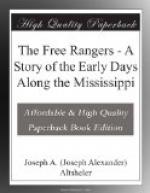The space between the combatants was lighted up by the incessant flash of the firing. Little jets of water where a missent bullet struck were continually spouting up, and then would come a bigger one when a cannon ball plunged into the depths of the bayou.
Paul suddenly heard a heavy impact, a crash, as of ripping wood, and a cry. A canoe near them had been struck by a cannon ball, and practically broken in half. It sank in an instant, and one of the men in it, wounded in the arm, and crippled, was sinking a second time, when Paul sprang into the water and helped him into their own boat. But not all the wounded were so fortunate. Some sank, to stay, and the dark night battle, far more deadly than that of the night before, reeled to and fro.
The combat at first had been more of a spectacle than anything else to Paul. The extraordinary play of light and darkness, the innumerable shadows and flashes on the surface of the bayou, the black tracery of the forest on either bank, the red beads of flame from the rifle fire appearing and re-appearing, made of it all a vast panorama for him. There were the sounds, too, the piratical shout, hoarse and menacing, the Indian whoop, shriller and with more of the wild beast’s whine in it, the fierce, sharp note of the rifle fire, steady, insistent, and full of threat, and over it the heavy thudding of the great guns.
It was Paul’s eye and ear at first that received the deep impression, but now the aspect of a panorama passed away and his soul was stirred with a fierce desire to get on, to cut through the hostile line, to crush down the opposition, and to reach the full freedom of the wide river. He began to hate those men who opposed them, the fire of passion that battle breeds was surely mounting to his head. Unconsciously, Paul, the scholar and coming statesman, the grave quiet youth, began to shout and to hurl invectives at those who presumed to hold them back. The barrel of his rifle grew hot in his hand with constant loading and firing, but he did not notice it. He still, at imminent risk to himself, sent his bullets toward the dark line of Indian canoes and the flashing hulk of the ship behind them.
The supply fleet was beginning to suffer severely. A number of boats and canoes had been sunk and nearly a score of men had been killed. Many more were wounded and, despite all this loss, they had made no progress. The fire from the bank, moreover, was beginning to sting them and to stop it Adam Colfax landed more men. The increased force of the Americans on the shore served the purpose but they were still unable to force the mouth of the bayou. The schooner seemed to be fixed there and she never ceased to send a storm of bullets and cannon balls at them.
Adam Colfax had a slight wound in the arm, but his slow cold blood was now at the boiling point.
“We’ve got to force that schooner!” he cried. “We’ve got to take her, if it has to be done with boarders! We can never get by unless we do it!”




